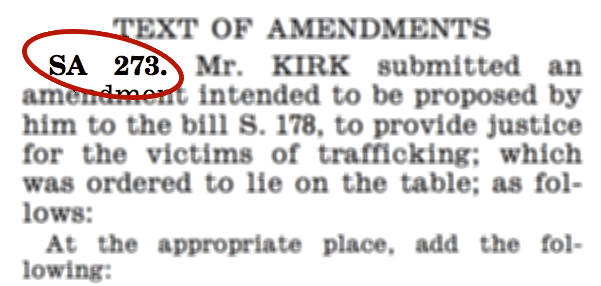Senate Attorney General Confirmation Deal Jeopardizes Free Speech Online

Today, the Senate is set to vote on the Justice for Victims of Trafficking Act (JVTA), the bill that last month turned into a partisan battleground over federal funding for abortion and a roadblock to the confirmation of Loretta Lynch as Attorney General. There’s been extensive media coverage of the Congressional logjam, and yesterday there was news that an agreement has been reached to move both issues forward.
Unfortunately, part of the deal to move the bill forward appears to include a version of the SAVE Act which will amend existing federal anti-trafficking law in vague ways that will be used to prosecute online content hosts for third-party content. This bill, Amendment 273 to the JVTA, closely parallels a version of the SAVE Act that passed the House in January. Almost a year ago, we wrote about the threat that the House bill poses for free expression online.
Amendment 273 would add the undefined offense of “advertises” to existing federal criminal law prohibiting sex trafficking (See CDT’s unofficial redline of 18 USC § 1591). This is a small but significant change. The current law is comprehensive and should enable prosecutors to pursue any actor who is directly involved in a trafficking venture. This amendment would presumably expand the scope of those individuals who could be held criminally liable for the activities of a trafficking venture – specifically, those online content platforms who host third-party content, which may include trafficking ads.
The bill’s sponsors in the House and Senate are clear that the purpose of the legislation is to allow for prosecution of online classified ad sites
Indeed, the bill’s sponsors in the House and Senate are clear that the purpose of the legislation is to allow for prosecution of online classified ad sites like Craigslist and Backpage.com. Representative Wagner, the bill’s sponsor in the House, and Senator Kirk both routinely refer to the need to prosecute online advertising sites in their advocacy around the bill. And Senator Feinstein questioned experts about the issue of online platforms at a hearing on unrelated anti-trafficking bills back in February—though the experts did not condemn online platforms and quickly turned the discussion back on-topic.
One of the problems with Amendment 273 is that it’s not clear exactly what effect it will have on the law. This vagueness and the resulting uncertainty it brings for hosts of third-party content will create a chilling effect on hosts’ willingness to allow users to upload content to their platforms. The specter of facing federal criminal trafficking charges over content created by someone else will make content hosts extremely wary and will encourage over-blocking of wholly lawful, constitutionally protected speech.
Amendment 273 will actually discourage proactive filtering and screening mechanisms that many platforms currently employ.
One thing is clear: by creating a situation where a host is vulnerable to liability if it has knowledge of trafficking-related content on its servers, Amendment 273 will actually discourage proactive filtering and screening mechanisms that many platforms currently employ. If a website operator screens an ad and allows it to remain up, and that ad is later revealed to be connected to a trafficking venture, that operator could face criminal prosecution for his knowing hosting of that ad. It will be much less risky for operators of social media platforms and classified ad sites to disavow all knowledge of the content on their sites – and anything they do receive notice of is likely to be taken down.
This perverse incentive against good-faith efforts to filter content is precisely what Section 230 was written to avoid. Amendment 273 doesn’t change Section 230; rather, it makes use of an existing exemption in that statute for federal criminal law. Clever legislators have realized that they can circumvent Section 230’s protections for intermediaries by creating new federal criminal publishing liability – a radical step that a coalition of 20 free expression organizations, trade associations, and law professors wrote to oppose earlier this year.
As Senator Ron Wyden noted in an impassioned defense of free expression on the Senate floor late last night, this amendment is an attack on a cornerstone of Internet law. We urge the Senate to reject Amendment 273 and to keep JVTA focused on prosecuting the actual traffickers and providing much-needed victim services.


